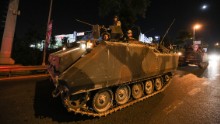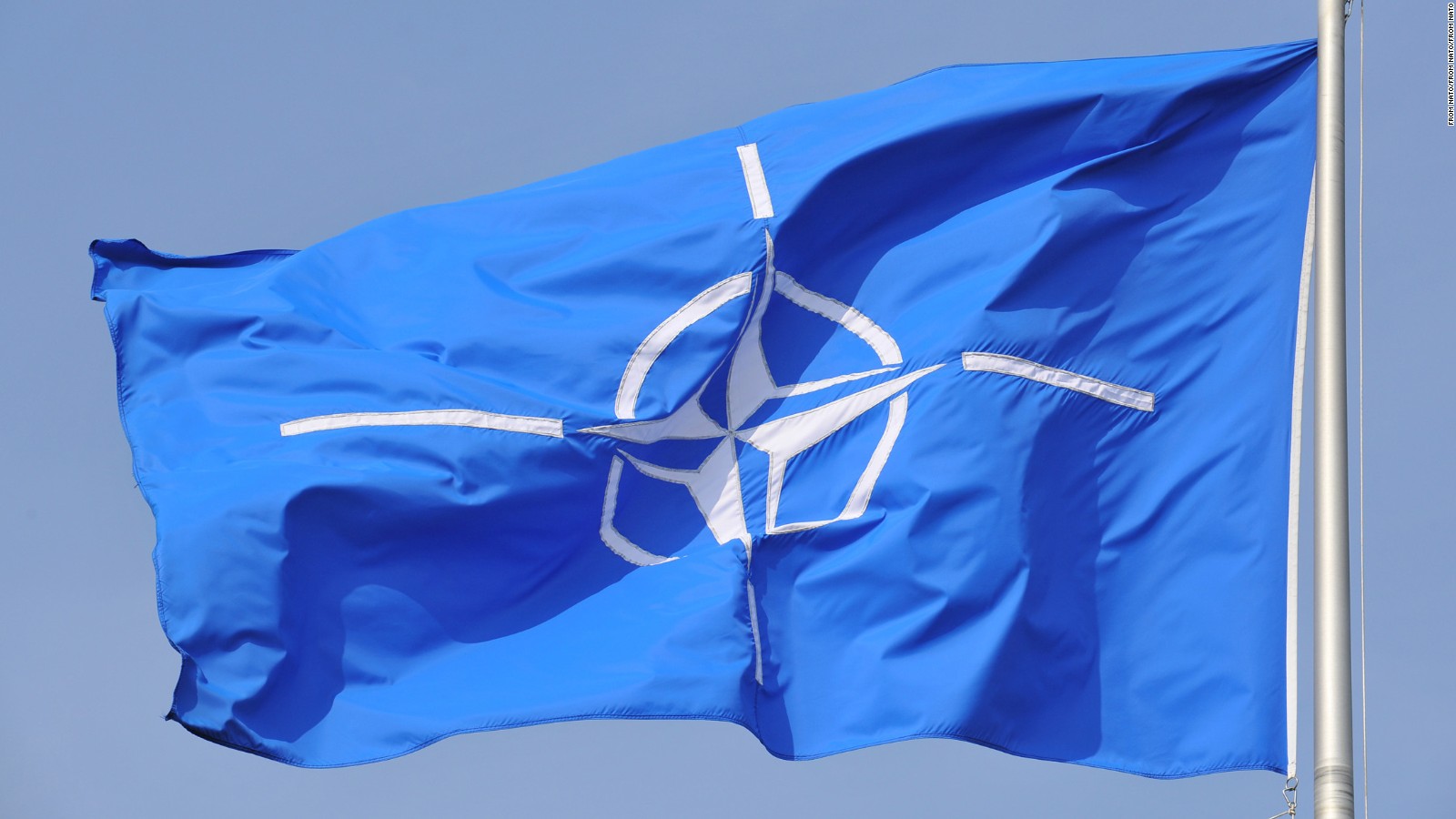And
Erdogan's more anti-Western tone and authoritarian behavior -- it now
ranks behind Russia, Venezuela and Algeria in press freedom -- has
concerned the U.S. "It's no secret that there are some trends within
Turkey that I have been troubled with," Obama said in April.
Now there are fears that Erdogan could go much further.
In
an early warning sign, the Ankara chief public prosecutor's office took
nearly 200 top Turkish court officials, including members of the
supreme court, into custody, Anatolian News Agency reported Saturday.
Though Erdogan has frequently railed against and curtailed the
judiciary, there has yet to be any evidence that has indicated that its
members were behind the coup.
If
Erdogan continues to crackdown aggressively on the opposition and jail
dissidents not involved with Friday's events, this could further strain
in U.S.-Turkey relations.
U.S. military cooperation with Turkey could suffer
Turkey,
a NATO member since 1952, has the second-biggest armed forces in NATO
and is one of only two Muslim-majority members of the 28-nation defense
alliance.
Turkey and the U.S. have
had a very close military relationship, with the U.S. operating several
military installations there, including the Izmir Air Station and
Incirlik Air Base. NATO's Allied Land Command headquarters, led by U.S.
Army Lt. Gen. Darryl Williams, is also located in Izmir. And NATO
announced last week at its summit in Warsaw, Poland, that it would
deploy its AWACS reconnaissance planes to Turkey to help combat ISIS.
The
spokesman for U.S. European Command, Capt. Danny Hernandez, told CNN
that five U.S. military installations in Turkey, including Incirlik, had
been placed under the highest threat warning.
The
decision to move to the highest level, Hernandez said, was not only
because of the current situation but also based on potential threats to
U.S. citizens, service members, families and other personnel.
NATO
Secretary General Jens Stoltenberg took to Twitter early Saturday to
announce that all NATO personnel were safe and accounted for. He also
issued his support for the democratically elected government.
And
NATO's top military officer, U.S. Gen. Curtis Scapparotti, said
Saturday that "Turkey is a strong NATO Ally and an important partner in
the international Coalition against ISIL."
The
Turkish Chief of the General Staff, Gen. Hulusi Akar, is "highly
regarded" in the U.S., Aaron Stein, a senior fellow at the Atlantic
Council think tank in Washington, D.C., told CNN.
During
the coup attempt, Erdogan said Akar had been held hostage by the
plotters. Akar appeared with the prime minister on Saturday, signaling
strong backing of the government.
But the fallout from the failed coup could have a disruptive impact on this military-to-military cooperation.
"This is not supposed to happen in a NATO country," Stein, who specializes in U.S.-Turkey relations, said.
Still,
Turkey is no stranger to coups, with the military seizing power in
1960, 1971 and 1980. The military was also instrumental in convincing
the government to resign in 1997.
During
those previous coups, the Turkish officers, largely pro-Western and
secular, sought to maintain close relations with NATO and the U.S.
Some
of the officers involved in Friday's putsch said they intended to
maintain Turkey's NATO commitments according to an announcement made on
state TV in the early hours.
In
contrast, the U.S. has had difficulties working with Erdogan's
Islamist-oriented AKP, which has opposed some U.S. moves in the Middle
East. Washington has often felt that Ankara could do more to crack down
on Islamist groups in Turkey, stop the flow of foreign fighters against
its borders and prioritize the fight against ISIS over its historic
rivalry with the Kurds, a key ally of the U.S. in fighting terrorists in
Syria and Iraq.
While
military-to-military cooperation between American and Turkey has
improved significantly in the last six months, according to Stein, the
upheaval in the army and the potential decrease in authority for
pro-Western factions in the military could affect the course of this
cooperation.
The military could be less able to help the U.S. even if it wants to
Turkey's already strained military will likely face further constraints, the Atlantic Council's Stein noted.
He
pointed out that Turkish forces have been in an intense battle with the
Kurdish separatist group, the PKK, in the southeast while also
contending with ISIS to the south, a threat encapsulated by ISIS' recent
deadly attack on Istanbul's airport. Turkey's domestic security forces
are similarly burdened by multiple threats on multiple fronts.
In
the wake of the failed coup, Erdogan is likely to purge the military of
coup-backers and others he deems to be disloyal. Prime Minister Binali
Yıldırım said Saturday that more than 2,800 officers, including some
generals and colonels, had already been detained.
Forced
to endure purges and internal turmoil, Turkey's military would face
even more pressure on its personnel as its leadership comes under
suspicion by the ruling party.
Erdogan
had previously sacked hundreds of high-ranking military officers for
disloyalty during his tenure as Turkish prime minister from 2003-2014.
On Friday night, Erdogan vowed to clean up the military.
A
destabilized military would be unlikely to be able to provide any
additional support to the U.S.-led fight against ISIS despite American
efforts to boost Turkish participation.
"ISIS
may take advantage of a likely security reshuffle and intensify
spectacular attacks in Turkey after a failed coup by military officials
on July 15," according to a report on the situation put out by the
Institute for the Study of War in Washington.
Turkey
is also a major recipient of U.S. arms sales, ranking third among
importers of American weapons in 2015. Such sales might be put in danger
by a military experiencing widespread upheaval.
The war against ISIS could be hindered in other ways, too
In
addition to a potential disruption in military cooperation in the war
against ISIS, there could be other setbacks from the U.S. perspective.
The
U.S. has long pressed Turkey to stem the tide of foreign fighters that
have traveled across Europe through Turkey and into Syria, believing
more could be done to stamp out the phenomenon.
"The
Turks let them in believing they were going to fight Assad," Bulent
Aliriza, director of the Turkey project at the Center for Strategic and
International Studies, told CNN in June.
Aliriza
added that the fact that many of these fighters would go on to join
ISIS was "an unintended byproduct" of Turkey's prioritizing its enmity
with Syrian President Bashar al-Assad. The U.S. would also like to see
Assad leave power but believes the fight against terror groups such as
ISIS and al-Nusra that exploit the long-raging Syrian civil war should
take priority.
A distracted Turkey
-- which has called the criticism over its handling of foreign fighters
unwarranted -- will now be even less inclined and able to intensify its
focus on the hard-to-solve problem of keeping foreign fighters from
transiting through the country.
Exactly what the U.S. doesn't want: More instability
The
coup attempt in a major NATO ally comes as other countries throughout
the Middle East are in chaos or on the brink of it, creating safe havens
for terror groups, feeding extremism and undercutting the historic U.S.
interest in a stable region.
Turkey
has been a relative bulwark of stability across Europe and the Middle
East, though riots, terror attacks and snap elections have already
disrupted the country. Now there's a possibility of armed clashes
between various political camps, or at the very least prolonged
infighting and disruption.
One
product of such turmoil could be even more Syrian refugees flooding
Europe -- a phenomenon that those countries already see as
destabilizing.
About 3 million
Syrians have fled to Turkey to escape the civil war. Turkey recently
struck a deal with the European Union in an effort to control the number
of refugees going to Europe, with the EU providing Turkey with billions
of dollars in aid.
In the coup
fallout and ensuing crackdown, these refugees could seek to escape
Turkey for Europe further complicating the situation of crucial U.S.
allies on that continent.
"The assumption has always been that Turkey is problematic but stable," Stein said.
CNN's Barbara Starr contributed to this report.

































 And Erdogan's more anti-Western tone and authoritarian behavior -- it now ranks behind Russia, Venezuela and Algeria in press freedom -- has concerned the U.S. "It's no secret that there are some trends within Turkey that I have been troubled with," Obama said in April.Now there are fears that Erdogan could go much further.In an early warning sign, the Ankara chief public prosecutor's office took nearly 200 top Turkish court officials, including members of the supreme court, into custody, Anatolian News Agency reported Saturday. Though Erdogan has frequently railed against and curtailed the judiciary, there has yet to be any evidence that has indicated that its members were behind the coup.If Erdogan continues to crackdown aggressively on the opposition and jail dissidents not involved with Friday's events, this could further strain in U.S.-Turkey relations.
And Erdogan's more anti-Western tone and authoritarian behavior -- it now ranks behind Russia, Venezuela and Algeria in press freedom -- has concerned the U.S. "It's no secret that there are some trends within Turkey that I have been troubled with," Obama said in April.Now there are fears that Erdogan could go much further.In an early warning sign, the Ankara chief public prosecutor's office took nearly 200 top Turkish court officials, including members of the supreme court, into custody, Anatolian News Agency reported Saturday. Though Erdogan has frequently railed against and curtailed the judiciary, there has yet to be any evidence that has indicated that its members were behind the coup.If Erdogan continues to crackdown aggressively on the opposition and jail dissidents not involved with Friday's events, this could further strain in U.S.-Turkey relations.


























































































No comments:
Post a Comment